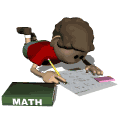



Top 10 Math Tips
|
1 Use scratch paper to write down the numbers you need to solve a problem | ||
|
2 Look for key words that tell you what kind of computation is needed | ||
|
3 Try out all answer choices until you find the one that is correct | ||
|
4 Make sure you know what to solve for in each problem. Write a number sentence or an equation to help you solve it | ||
|
5 Write down each piece of information given in a problem, and write down or circle what each problem asks you to find. When you have an answer, go back and make sure it answers the question you wrote down or circled. | ||
|
6 Rename fractions with different denominators as like fractions. | ||
|
7 Always reduce fractions to their smallest parts. | ||
|
8 For a measurement or geometry problem, first write down the formula you need to solve the problem. Then plug into the formula the numbers from the problem. | ||
|
9 Remember an equation must stay balanced. What you do to one side of an equation you must do to the other side. | ||
|
10 Check problems by doing the opposite |
![]() Order of Operations: (Please, Excuse, My, Dear,
Aunt, Sally)
Order of Operations: (Please, Excuse, My, Dear,
Aunt, Sally)
![]() Do operations within parentheses first ( ) P
Do operations within parentheses first ( ) P
![]() Do powers (exponents) and roots E
Do powers (exponents) and roots E
![]() Do multiplication and division from left to right M D
Do multiplication and division from left to right M D
![]() Do addition then subtraction in order from left to right
A S
Do addition then subtraction in order from left to right
A S
![]() Fractions, Decimals, Percents
Fractions, Decimals, Percents
3/5 the 3 or top number is the numerator, the 5 or bottom number is the
denominator
![]() To add or subtract fractions
you must first have a common denominator
To add or subtract fractions
you must first have a common denominator
1/3 + 2/5 = 5/15 + 6/15 = 11/16
![]() To
multiply: multiply the 2 numerators and then the 2 denominators
To
multiply: multiply the 2 numerators and then the 2 denominators
1 2
1 x 2 = 2
3 X 5 3 x 5 = 15
![]() To divide: multiply the first with the reciprocal of the second
To divide: multiply the first with the reciprocal of the second
2
1 = 2 x 6
= 12
3
/6 = 3 x 1 3
or an answer of 4 when you reduce the fraction to lowest terms
![]() Fractions, Decimals, Percents
Fractions, Decimals, Percents
1 = 1.0 = 100%
1/8 = .125 = 12.5%
½ = .5 = 50%
1/9 = .111 = 11.1%
1/3 = .33 = 33.3%
1/10 = 0.1 = 10%
¼ = .25 = 25%
1/12 = .0833 = 8.33%
1/5 = 0.2 = 20%
2/3 = .6666 = 66.66%
1/6 = .166 = 16.6% ¾ = 0.75 = 75%
|
Any number over itself is = to 1 |
Example: 3/3 = 1 20/20 = 1 100/100 = 1 5000/5000 = 1
|
An IMPROPER Fraction: 16/5 = sixteen fifths | ||
|
A MIXED NUMBER: 3 1/5 = three and one fifth |
To change an improper fraction to a mixed number you divide: 16/5 = 5 | 16
5 goes into 16 3 times (5 x 3 = 15)
16 - 15 = a remainder of 1 your answer is then 3 1/5
To change a mixed number to an improper fraction: (A b/c =A*c+b/c)
3 1/5 = take 5 multiply it by 3 then add 1 and put it over 5
5*3=15+1=16 answer is 16/5
|
FACTOR TREES |
Example: 24
/ \
6 x 4
/ \ / \
3 x 2 2 x 2
Prime Factors of 24 are 3 * 2 * 2 * 2
|
To find a common factor of 24 and 40 : |
40
/ \
8 x 5
/ \ |
4 x 2 5
/ \ | |
2 x 2 2 5
Prime Factors of 40 = 2 * 2 * 2 * 5
Prime factors of 24 = 2 * 2 * 2 * 3
The GCF of 24 and 40 are 2 * 2 * 2 or 8
![]() Symbols
Symbols
less than <
Greater than >
Is equal to =
Is smaller or equal to <
Is greater or equal to >
![]() Measurements
Measurements
1 foot = 12 inches 1 yard = 3 feet
1 mile = 1760 yards
1 Tablespoon (T) = 3 teaspoons (t)
1 cup (c) = 16 T = 8 fluid ounces (fl oz)
1 pint (pt) = 2 c 1 quart (qt) =
2pt = 4 c = 32fl oz
1 gallon (g) = 4 qt
|
Perimeter of a square or rectangle = P= l + l+ w + w
or 2l + 2w or 2(l + w) | ||
|
Area = A= l x w | ||
|
Volume = l x w x h | ||
|
Area of a triangle = base x height/2 |
L i n k s
Brain Teasers Math Challenges National Math Trail
![]()